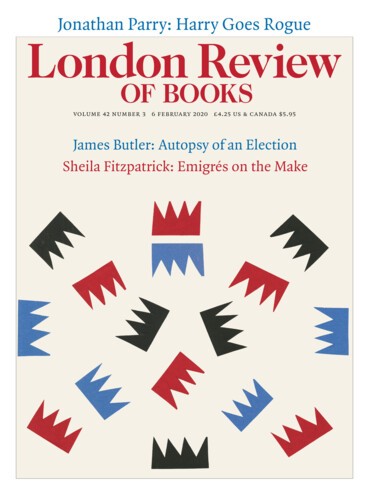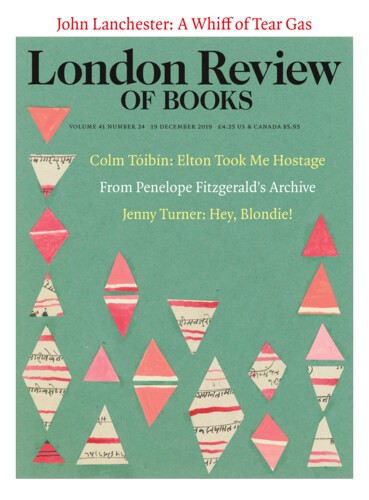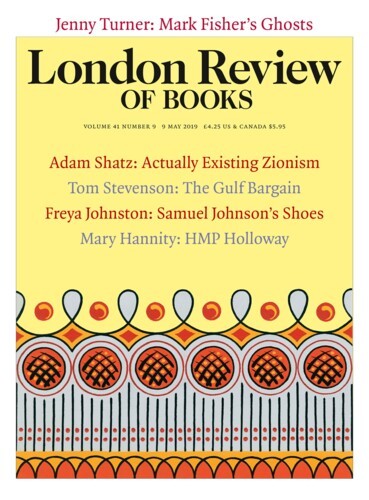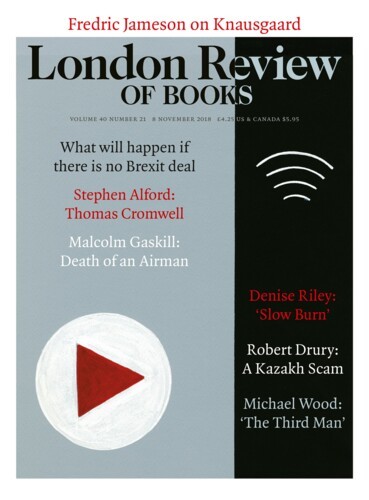Stefan Collini
Stefan Collini is the author of Absent Minds: Intellectuals in Britain, What Are Universities For? and The Nostalgic Imagination: History in English Criticism. His edition of Orwell’s Selected Essays was published in 2021. He is an emeritus professor of intellectual history and English literature at Cambridge.
In real sound stupidity the English are unrivalled: ‘Cosmo’ for Capitalists
Stefan Collini, 6 February 2020
‘How do you write like the Economist?’ a new member of staff asked as he began to compose his first leading article for the paper some years ago. ‘Pretend you are God,’ a senior colleague replied. Given that the deity tends not to comment directly on current affairs these days, the anxious recruit may have struggled to put this advice into practice. Browsing leaders from the previous couple of decades might have yielded a more concrete sense of what was wanted. It would appear that omniscience is one attribute of the God-like perspective; absence of self-doubt is another. Then there is a lapidary style leavened by the obiter dicta of powerful individuals, plus a tendency to reiterate a few stern commandments, which one might imagine as: ‘Thou shalt not inhibit economic growth.’ ‘Thou shalt not be parochial.’ ‘Thou shalt not worship false gods – and don’t pretend thou knowest not the ones we mean.’
The Enlightened Vote: Ernest Renan
Stefan Collini, 19 December 2019
‘Whatever may be the judgment of time on the intrinsic value of Renan’s contribution to the sum of knowledge, he can never lose his place among the few great names in the history of letters.’ This assessment from the 1901 edition of Chambers’s Encyclopedia, equally striking today for its confidence and its remoteness, summarises the conventional wisdom at the...
Unreasoning Vigour: Ian Watt
Stefan Collini, 9 May 2019
‘My military career was on the comic side.’ Self-protective irony was Ian Watt’s chosen register when describing his wartime experience some twenty years later. That experience began when the 24-year-old Lieutenant Watt was posted, along with the rest of the 5th Battalion of the Suffolk Regiment, to the Far East in the winter of 1941. After a 20,000-mile journey by sea,...
Kept Alive for Thirty Days: Metrics
Stefan Collini, 8 November 2018
How much does your spouse or partner love you? Is it more or less than other people love their partners? To find out, we would need to measure the available evidence. Suppose that having identified the relevant population, we count how many times a week partners are brought tea in bed, how many times they are cuddled, how many times they are told ‘I love you,’ and so on. In...
Podcasts & Videos
Anthony Wilks's film traces the connections between the events of Eric Hobsbawm’s life and the history he told, from his teenage years in Germany and his communist membership, to the jazz clubs of 1950s...
Early and Late Kermode
Stefan Collini, Mary-Kay Wilmers, Thomas Jones and Andrew O’Hagan
Stefan Collini talks to Thomas Jones about the life and work of Frank Kermode, and Mary-Kay Wilmers remembers him as a contributor to the LRB.
Pieces about Stefan Collini in the LRB
Lumps of Cram: University English
Colin Kidd, 14 August 2025
What is the missing noun to which English refers: literature, language or both? If both, does English belong with the study of other modern languages and literatures? Is its primary concern with literature...
The Terrifying Vrooom: Empsonising
Colin Burrow, 15 July 2021
Reading an Empson essay is like being taken for a drive by an eccentric uncle in a terrifyingly powerful old banger. There are disturbing stains on the upholstery and an alarming whiff of whisky in the...
Is It Glamorous? Stefan Collini among the Intellectuals
David Simpson, 6 March 2008
George Orwell is commonly invoked as the ideal role model for the intellectual: feisty, independent, outspoken and contrarian, active in the public sphere, and famous. So it’s a surprise to...
Athenian View
Michael Brock, 12 March 1992
In seven of the nine chapters in this fine book Dr Collini depicts the denizens of the Athenaeum in its great days. T.H. Huxley, having left his umbrella at Matthew Arnold’s, asks his...
Burrinchini’s Spectre
Peter Clarke, 19 January 1984
Time was when Clio had a seamless garment: but that was before the division of labour set in. Prefixless history is now condescendingly thought of as ‘straight’ history and her...
Read anywhere with the London Review of Books app, available now from the App Store for Apple devices, Google Play for Android devices and Amazon for your Kindle Fire.
Sign up to our newsletter
For highlights from the latest issue, our archive and the blog, as well as news, events and exclusive promotions.




